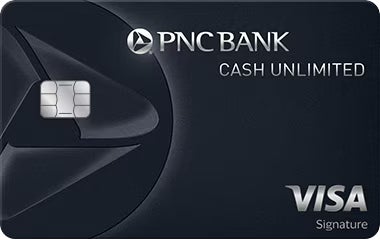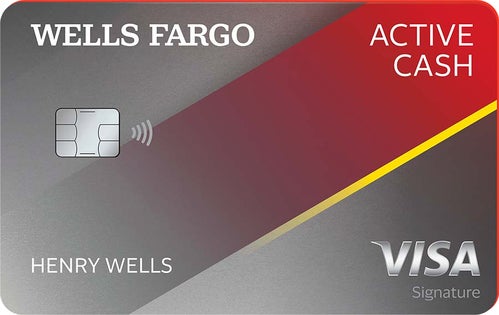
Let the cash-back card games begin. The latest PNC Cash Unlimited® Visa Signature* credit card, along with the Robinhood Gold Card*, is the latest to challenge the Wells Fargo Active Cash® Card for its title as the best flat-rate cash rewards card in town.
Between the PNC Cash Unlimited’s flat cash-back rate, lack of annual fee, introductory APR and newly added welcome bonus, the Active Cash is facing some serious competition.
Details about the PNC Cash Unlimited
Among the features of the PNC Cash Unlimited:
- Earns 2% cash-back rewards for every purchase, which you can redeem as statement credits or deposit the cash back directly into your PNC bank account or investment account
- Introductory 0% balance transfer APR for 15 billing cycles (then 20.24% to 30.24% variable)
- No annual fee
- No foreign transaction fees
- Purchase security feature, which protects your new purchases against “covered circumstances” for 90 days
- Cellphone protection, which covers up to $800 to replace your stolen or damaged phone after a $50 deductible
The PNC Cash Unlimited vs. the Wells Fargo Active Cash
Both credit cards earn the same rewards rate and feature an introductory APR, but there are some important distinctions to call out.
Introductory APR
Both credit cards feature an introductory APR offer for balance transfers, but the Active Cash has an edge here because it also provides a 0% introductory APR for purchases.
Here are both intro offers:
- PNC Cash Unlimited: 0% introductory APR for qualifying balance transfers for the first 15 months (then 20.24% to 30.24% variable)
- Wells Fargo Active Cash: 0% introductory APR on purchases and qualifying balance transfers for 12 months from account opening (then 20.24%, 25.24% or 29.99% variable)
While a balance transfer could help you avoid interest accruing on another card’s balance, it also means you shouldn’t use your reward credit card while you work to pay off the transferred balance. Considering earning rewards for your purchases is the primary use of both of these cards, an introductory purchase APR is more useful than a balance transfer offer.
Purchase protections
The Wells Fargo Active Cash doesn’t provide any kind of purchase protection, whereas the PNC Cash Unlimited will insure your new purchases for 90 days.
Cellphone protection
This one is close: the Active Cash offers up to $600 in cellphone damage or theft protection after a $25 deductible.
The PNC Cash Unlimited offers more coverage -- up to $800 -- but also has a higher deductible of $50.
Foreign transaction fees
The Active Cash charges a 3% foreign currency conversion fee, meaning it’s not a good option to take with you if you plan to travel internationally.
However, the PNC Cash Unlimited doesn’t charge a foreign transaction fee, which means if you don’t already have a travel credit card, you could use it overseas without having to worry about paying extra for your transactions.
Welcome bonus
The PNC card lets new cardholders earn $250 after spending $1,000 or more in purchases during the first three months following account opening. That helps even the playing field between the two cards, as the Active Cash offers a $200 cash rewards bonus after spending $500 in purchases in the first three months.
The Active Cash still offers a better bonus despite the lower payout, because you also need to spend $500 less to qualify for it. To reach its bonus, you’d need to spend at least $167 monthly for three months. To reach the PNC card’s bonus, you’d need to spend around $334 monthly for three months to qualify for only $50 more.
What about the Robinhood Gold Card?
The new card from Robinhood earns 5% cash back for travel booked through Robinhood and 3% cash back for everything else. It doesn’t feature an introductory purchase APR or a welcome bonus. It also charges a $50 membership fee for Robinhood Gold.
There are some other distinctions when it comes time to redeem your rewards, and depending on how much you spend monthly, it won’t always be the most rewarding choice.
How to choose the right card
Since both credit cards earn the same rewards rate, the choice really comes down to the extras and what you plan to use it for. If you’re looking for a general rewards card to bring with you on an international trip this summer, the PNC card is the one to choose. However, its welcome bonus takes a bit more spending to earn, which gives the Active Cash a slight edge for non-travelers.
The Active Cash also features an introductory purchase APR that can help you avoid interest charges on your new purchases for a time. This is arguably more useful on a rewards credit card than an introductory balance transfer APR, sharpening that edge even more.
The bottom line
The PNC Cash Unlimited goes toe-to-toe with the Wells Fargo Active Cash, and even surpasses it in some respects. It’s lack of foreign transaction fees makes it the better choice for people with international travel booked. It also provides purchase protection, something the Active Cash lacks.
However, its welcome bonus doesn’t quite stack up to what the Active Cash offers, so if you’re looking for a fast pay out, you’ll want to choose the Active Cash. It also doesn’t feature an introductory purchase APR like the Active Cash does, which means the Active Cash is the better choice if you’re looking to avoid interest charges on your new purchases.
*All information about the PNC Cash Unlimited and the Robinhood Gold Card has been collected independently by CNET and has not been reviewed by the issuer.
The editorial content on this page is based solely on objective, independent assessments by our writers and is not influenced by advertising or partnerships. It has not been provided or commissioned by any third party. However, we may receive compensation when you click on links to products or services offered by our partners.




